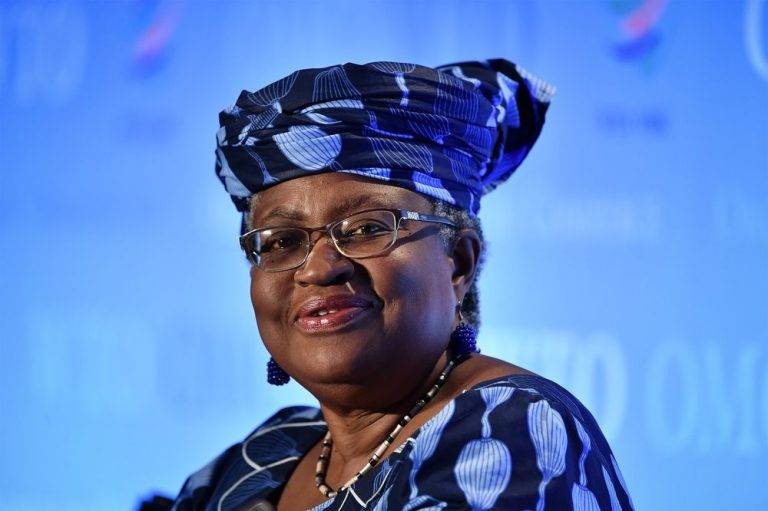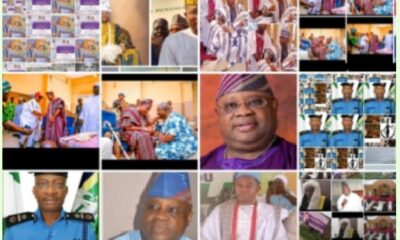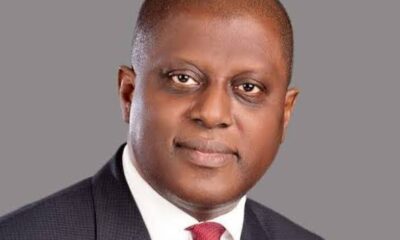News
MAY 29: Okonjo-Iweala tasks govs on debt management, others

According to her, it has become imperative for governors to focus on debt management because the country has challenges on the fiscal, debt, and monetary policy fronts as the nation’s gross debt level had climbed from N19.3 trillion in 2015 to $N91.6 trillion in 2023, adding that the debt-to-GDP ratio has almost doubled from 20 percent to 39 percent over that time period.
Speaking yesterday in Abuja at the opening of the 2023 induction for re-elected and elected governors, the former Finance Minister, who noted that while the debt-to-GDP ratio may not look so alarming, as revenues decline, the burden of debt servicing has increased dramatically.
She said:”The fiscal deficit of 5.3 percent of GDP is higher than our agreed fiscal rule of three percent of GDP, this has to be carefully monitored and brought down. Dealing with the fiscal deficit will of course be infinitely more difficult with an oil subsidy bill of N3.36 trillion for the first half of 2023 (or N6.72 trillion if not removed). The deficit is made worse by revenue losses from oil theft. The difficulties around this issue underscore the importance of political consensus, whether you are in government or in the opposition on policies critical for nation-building.”
She urged the governors to invest in infrastructure, education and basic healthcare and endeavour to pay teachers, healthcare workers and pensioners.
She also asked them to start diversifying their Revenue base and not to depend on Oil and Gas and not to wait when the country no longer has Oil and its revenue.
Further, she said: “We used to publish this information during my time as finance minister under President Obasanjo and Jonathan’s administrations, you must resume this practice, so that your citizens can have information to your account.
“Your Excellencies, please watch your debt profiles and keep careful control of expenditure. Even as we invest in infrastructure, education and basic healthcare, please endeavour to pay teachers, healthcare workers.”
She noted that states have a substantial responsibility, while only few states were raising internally generated revenue of any significance, urging the governors to figure out ways to increase internally generated revenue (IGR), adding that this should go hand in hand with their share of the federal allocation.
Okonjo-Iweala was the Finance Minister under the Olusegun Obasanjo’s administration and former Coordinating Minister of the Economy and Minister of Finance, under the Goodluck Jonathan’s administration.
Quoting from an analysis of data from the National Bureau of Statistics, and state audited financial statements by the budgit, which provides in-depth financial reports on country budgets helping citizens understand where their country’s money goes, he noted that 33 states relied on federal transfers for the majority of their revenue, for 13 of the states, the monthly impact allocations accounted for about 70 percent of revenue.
According to her, aggregated IGR from the states did rise from N1.2 trillion in 2020 to N1.6 1 trillion in 2021. But this pales in comparison to FAAC allocations to state of N2.23 trillion in 2020 “You have asked me to address you on the task of nation-building. Every nation is a work in progress. The task of nation-building is a continuous one. So, even if we have made mistakes, there is always a chance to change course. The fatal mistake in nation-building is refusing to learn lessons, and failing to course-correct where needed.
“In our country, given its size, diversity, and economic development challenges, the scale of the task of nation-building is particularly large.
“As you take office or return to your governorships, our 222 million compatriots will be counting on you to rise to the occasion. The states are closest to the people: what you do- or don’t do – directly impacts people across the country.”
-

 Politics7 days ago
Politics7 days agoGov. Diri Totally Committed To Bayelsa’s Development, Growth, And Progress; George Turnah Tells Visiting Ogbia Ward 9 PDP Executives And Stakeholders
-

 News6 days ago
News6 days agoThere Is No Worker In Level 1 Step 1 Today In Nigeria, We Only Have Workers From Level 4 – Joe Ajaero
-

 Niger Delta6 days ago
Niger Delta6 days agoEx-Niger Delta Militant Hails Tinubu’s Reforms, Seeks Intensified Security Of Oil Installations
-

 Politics6 days ago
Politics6 days agoJUST-IN: Reinstated Edo State Deputy Governor, Philip Shaibu Kneels For Oshiomhole After Dumping PDP For APC
-

 News4 days ago
News4 days agoNYSC Member Allegedly Impregnates 5 Secondary School Students in Sokoto
-

 Sports6 days ago
Sports6 days agoChelsea offered TWO elite strikers as Victor Osimhen ‘agrees’ transfer
-

 Business4 days ago
Business4 days agoUPDATE: How NNPC Spent N7.3Billion On Entertainment In 16 Months NNPCL GMD, Mele Kyari
-

 News4 days ago
News4 days agoPolice Sergeant Shoots Father Dead After Drinking To Stupor
















